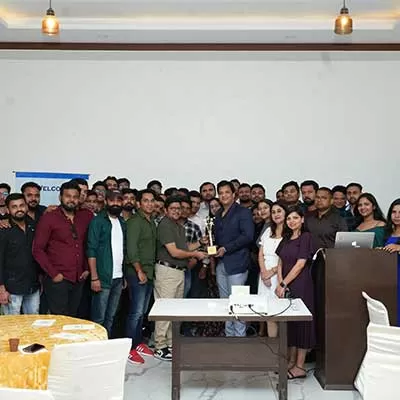Our team just returned from GITEX Global 2025 in Dubai, and the week was nothing short of extraordinary. Walking through the bustling halls, attending live demos, and connecting with innovators from around the world gave us a firsthand look at how AI and emerging technologies are shaping business, governance, and daily life.
This year, GITEX felt different. It wasn’t about distant possibilities or concepts on a whiteboard. The focus was on solutions already in motion, demonstrating how AI is moving from pilot projects to real-world implementation. From AI-powered devices to smart home systems, public sector innovations, and infrastructure projects, the event showcased a future that’s already here.
Here’s a detailed look at what caught our attention and what we experienced firsthand.
1. Microsoft Surface Copilot+ PCs: AI in Everyday Work
One of the first booths we visited was Microsoft, which introduced its Surface Copilot+ PCs. These devices, equipped with built-in 5G and agentic AI capabilities, are designed to handle AI workloads seamlessly while providing real-time insights and suggestions.
Our team had the chance to test the devices ourselves. The AI assistant could summarize documents, highlight key action points, and provide context-aware suggestions without leaving the current app. In our discussions with Microsoft representatives, it became clear that these PCs are aimed at helping teams work smarter, faster, and more securely.
For businesses across the UAE and the Middle East, the shift is tangible: AI is no longer a “nice to have.” It is integrated into the tools teams use daily, accelerating productivity and decision-making in ways that weren’t possible before.
2. Abu Dhabi’s AI Public Servant
One of the most talked-about launches at GITEX was Abu Dhabi unveiling the world’s first AI-powered public servant, integrated into TAMM, the city’s unified digital platform. The AI agent automates tasks such as driving license renewals, bill payments, and service notifications, anticipating user needs and guiding citizens through processes.
The agent’s ability to predict potential issues and provide proactive support was striking. There was a seamless combination of speed, accuracy, and contextual awareness, reflecting a public service model that is already transforming the citizen experience.
This innovation sets a benchmark for governments worldwide, highlighting how AI can be embedded into essential services to enhance efficiency and responsiveness.
3. CyberKnight and Akamai: Reinventing Cloud Security
Security and scalability were front and center at the CyberKnight and Akamai collaboration booth. The two companies announced an expanded partnership to strengthen cloud security and edge innovation, showcasing solutions designed to meet the growing digital demands of enterprises in the region.
During the demonstration, we explored capabilities like Web Application & API Protection (WAAP), DDoS mitigation, microsegmentation, and edge compute services. The emphasis was on creating secure, high-performance digital environments while keeping compliance front and center.
It was clear from the conversations that organizations across industries are moving faster in adopting cloud and AI technologies, and having secure, reliable infrastructure is becoming a critical enabler.
4. AI in Smart Mobility
Transportation was another area where AI made a tangible impact. Dubai Roads and Transport Authority (RTA) showcased its AI-powered Trackless Trams, offering a glimpse into the future of public mobility.
Our team witnessed trams navigating routes autonomously, responding to traffic conditions, and providing predictive maintenance updates. The system demonstrates how AI can integrate transportation, energy, and infrastructure management, creating smarter, more efficient cities.
It was clear that the UAE isn’t just investing in technology; it’s reimagining urban life, with AI at the center of sustainable mobility solutions.
5. EZVIZ Smart Homes: Anticipating Needs with AI
Next, we visited EZVIZ, which expanded its AI-powered smart home lineup under the theme “Automate Imaginations for Homes.” The devices on display went beyond responding to commands. They were designed to anticipate needs, adjusting lighting, temperature, and security automatically based on learned patterns.
We spent a significant amount of time interacting with the devices. Motion sensors, connected cameras, and smart assistants worked together to create an environment that felt aware, intuitive, and proactive. The team at EZVIZ shared that regional considerations, including privacy and energy efficiency, are embedded into every product.
Seeing this in action reinforced a trend we noticed across the event: AI isn’t futuristic. It’s being embedded into the environments where people live and work today.
6. AVA 2.0 for Smarter Workflows
The ARORA Corporation booth introduced AVA 2.0, the next iteration of their AI-enabled Administrative Virtual Assistant. AVA has been used to streamline government workflows, and the new version brought enhanced autonomy, governance, and security features.
Our team observed live demonstrations where AVA could summarize complex requests, flag compliance concerns, and provide actionable recommendations, all without manual intervention. For governments, this is a step toward more responsive, efficient, and transparent operations, freeing staff to focus on higher-value work.
It was impressive to see AI supporting structured decision-making while maintaining full observability and accountability. AVA 2.0 showcased a level of maturity that signals AI moving from experimentation to everyday use.
7. Stargate UAE: Building an AI-First Infrastructure
The UAE is also investing in AI infrastructure at an unprecedented scale. Stargate UAE, a 5-gigawatt AI-focused data center campus led by G42, is set to bring the first 200 megawatts online in 2026.
During our visit, we discussed with G42 representatives how the campus will be powered by nuclear, solar, and natural gas energy, providing a massive and sustainable compute resource for AI workloads. Major players including Nvidia, OpenAI, Cisco, Oracle, and SoftBank are involved, underscoring the UAE’s vision to become a global AI hub.
This infrastructure is foundational, enabling enterprises, governments, and innovators to deploy AI at scale while maintaining security, compliance, and energy efficiency.
8. Global Collaboration in Innovation
GITEX 2025 also showcased regional collaboration, particularly through the Kerala IT Pavilion. The pavilion featured 28 companies from Thiruvananthapuram, Kochi, and Kozhikode, demonstrating solutions in AI, data analytics, cloud, ERP, DevOps, and cybersecurity.
Our team engaged with delegates from Kerala, exploring how cross-border partnerships can accelerate innovation. From startups to mature enterprises, it was evident that collaboration between India and the UAE is creating new opportunities for digital transformation in multiple sectors.
9. Emerging Trends and Common Threads
After attending panels, keynotes, and interactive sessions, we noticed several patterns:
- AI is embedded in every sector: From homes to offices, transportation, and governance, AI is present in workflows, decision-making, and user experiences.
- Security and transparency are non-negotiable: Solutions highlight compliance, observability, and governance, especially in sensitive sectors.
- Infrastructure is a cornerstone: Investments in large-scale AI campuses and edge computing are enabling high-performance solutions.
- Proactivity over reactivity: Many applications, from public services to smart homes, anticipate user needs instead of just responding.
- Partnerships amplify impact: Collaboration between companies, regions, and sectors accelerates innovation and adoption.
Experiencing the Future Firsthand
Walking the halls of GITEX 2025, it was impossible not to feel that we were seeing the future take shape. AI is no longer a concept in conference presentations; it’s already integrated into the devices, services, and systems around us.
Our team returned inspired by the scale of innovation, the practical applications of AI, and the collaboration driving change. The UAE is demonstrating that the next era of technology is not about waiting but about acting, embedding intelligence into infrastructure, operations, and daily life.
From agentic AI in enterprise devices to smart homes, public sector automation, and intelligent transport, the event confirmed that innovation is already here. And it’s happening fast.
For any organization, whether business, government, or startup, the message is clear: engage, experiment, and integrate AI now. Those who do will be best positioned to leverage the insights, automation, and efficiency that are becoming the standard.
GITEX 2025 was not just an exhibition; it was a demonstration of how the future is being built today. Experiencing it firsthand reminded us that innovation isn’t theoretical; it’s tangible, immediate, and full of opportunities for those ready to act.

Nitin Agarwal is a veteran in custom software development. He is fascinated by how software can turn ideas into real-world solutions. With extensive experience designing scalable and efficient systems, he focuses on creating software that delivers tangible results. Nitin enjoys exploring emerging technologies, taking on challenging projects, and mentoring teams to bring ideas to life. He believes that good software is not just about code; it’s about understanding problems and creating value for users. For him, great software combines thoughtful design, clever engineering, and a clear understanding of the problems it’s meant to solve.
 sales@wildnetedge.com
sales@wildnetedge.com +1 (212) 901 8616
+1 (212) 901 8616 +1 (437) 225-7733
+1 (437) 225-7733































